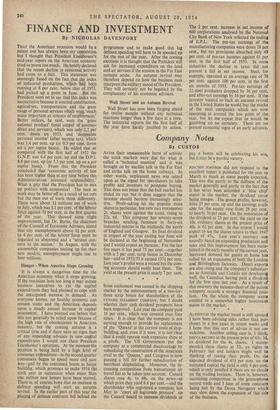Company Notes
By CUSTOS AFTER their unseasonable burst of activity the stock markets were due for what is called a 'technical reaction' and it was brought on by warlike talk in the Far East and strike talk on the home railways. In
other words, unpleasant news was seized upon as the signal for speculators to take profits and investors to postpone buying. This does not mean that the bull market has ended its run but it does suggest that the investor should become increasingly selec- tive. Profit-taking hit the popular store shares in particular, but NEW DAY FURNISHING 2s. shares went against the trend, rising to 22s. 6d. This company has seventy-seven branches retailing furniture in forty-six industrial centres in the midlands, the north of England and Glasgow. Its final dividend in respect of the year ending last June' will be declared at the beginning of November and I would expect an increase. For the last five years it has paid 75 per cent.—together with a 5 per cent. scrip bonus in December last—and in 1952/53 it earned 1571 per cent. Last year's profits were a record but the com- ing accounts should easily beat them. The yield at the present price is nearly 7 per cent.
• • •
SOME excitement was caused in the shipping market by the announcement of a two-for- three scrip bonus for shareholders of the CUNARD STEAMSHIP COMPANY, but I doubt whether their cash dividend prospects have been improved. Last year the company paid 16 per cent., which was covered over four times. It is clear that the company is not earning enough to provide for replacement of the 'Queens' at the current costs of ship- building, and, even if it were, it is not clear . that it could operate such expensive ships at a, profit. The US Government put the company at a commercial disadvantage by subsidising the construction of the American, rival to the 'Queens,' and Congress is now passing a bill for further subsidisation of merchant shipbuilding. Moreover, the in- creasing competition from transatlantic air travel has to be taken into account. Cunard shares rose 4s. to 48s, on the news—at which price they yield 6.6 per cent.—and the shareholder who registered a company last May to 'exert all legitimate pressure' on the Cunard board to increase dividends or
pay a bonus will be celebiv.ting his win, but it may be a pyrrhic victory.
PINCHIN JOHNSON did not respond to the excellent report it published for the year to March as much as some people expected. This was due partly to the dullness of the market generally and partly to the fact that it has never been accorded a 'blue chip' status in the market, the dividend cover being meagre. The group profits, however, were 25 per cent. up and the earnings avail- able for the equity rose from 28 per cent. to nearly 36 per cent. On the restoration of the dividend to 25 per cent. the yield on the Ws. ordinary shares at the present price of 40s. is 6/ per cent. In due course I would expect to see the shares return to their 1947 peak of 47s. Last year's recovery was soundly based on expanding production and sales and this improvement has been main- tained in the early months of the current year. Increased demand for paints at home has called for an expansion of both the London and Birmingham factories. Direct exports are also rising and the company's subsidiar- ies in Australia and Canada are developing well, the Canadian having paid a dividend for the first time last year. As a result of this recovery the balance-sheet of the parent company records a stronger financial posi- tion. On the whole the company seems entitled to a somewhat higher investment status in the market.
ALTHOUGH the market trend is still upward I have been advising sales rather than pur- chases in a few cases in recent weeks and I hope that this sort of advice is not un- welcome. Another selling case is, I think, DECCA RECORD at the present price of 43s. 3d. ex dividend for the 4s. shares. I recom- Mended these shares at 32s. ex rights in February last and holders might well be thinking of taking their profit. On the expected dividend of 431 per cent. on the increased capital the yield is only 4 per cent. which is only justified if there are no clouds on the trading horizon. There is, however,
increasing competition in the gramophone record trade and I hear of some contracts being lost by the Decca Navigator which may slow down the expansion of this side of the business.


































 Previous page
Previous page